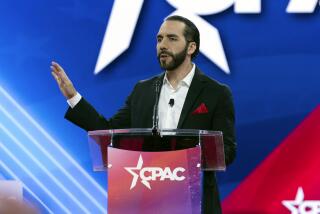Conservatives Fear ‘Illusory Peace’ in Central America
- Share via
WASHINGTON — President Reagan came under mounting pressure Thursday from conservative Republicans who contend that special envoy Philip C. Habib is trying to negotiate an “illusory peace” in Central America that will undermine U.S. support for the Nicaraguan rebels, known as contras .
In a letter to the President, eight House Republicans said they fear that Habib’s efforts at conciliation in Central America will produce a peace treaty that can be cited by congressional opponents of aid to the contras as a reason for blocking Reagan’s pending request for $100 million in humanitarian and military assistance.
The GOP congressmen also complained that Habib expressed to them the view that “the contras can’t win” in their battle against the Nicaraguan regime. They said he also promised Democrats that the Administration would halt support for the contras if Nicaraguan President Daniel Ortega signed the treaty along with other Central American leaders June 6.
In response to their letter, which was dated May 9 but not delivered to the White House until Wednesday or Thursday, Reagan aides said the President is considering a recommendation that he make a major speech to reaffirm his support for the contras. But White House officials said the recommendation has not yet been accepted by Reagan.
The Central and South American nations that make up the Contadora Group are expected to meet, beginning June 4, to conclude a treaty on regional peace agreements. As Reagan’s envoy, Habib has played a key role in developing the treaty.
An aide to Rep. Jack Kemp (R-N.Y.), one of the authors of the GOP letter, said the group of eight congressmen told the President they fear that Ortega will sign the treaty without any intention of observing it. She said such a treaty would create “an illusory peace much as you saw in Vietnam” and perhaps bring an end to U.S. aid for the contras.
But Administration officials argued to the contrary that Ortega is not likely to sign the treaty and his failure to sign it can be held up as evidence that Nicaragua--not the United States--is responsible for the continued fighting in the region. They pointed out that Ortega already has announced that he does not intend to put his name on the document.
“This is just additional evidence--if additional evidence was needed--that congressional idiocy knows no bounds and respects no party lines,” said a State Department official, who declined to be identified. “Bringing Habib in was a brilliant move to buy some credibility for the policy, especially among the Democrats. But it seems to have escaped some people.”
Rebel Leaders’ Meeting
The controversy arose as contras leaders met in Miami in the latest of several attempts to reunify their umbrella organization, the United Nicaraguan Opposition (UNO). Habib met with the group Wednesday, and rebel chieftain Adolfo Calero declared that he was “very satisfied” with the efforts of the President’s special envoy.
Bosco Matamoros, spokesman for the contras, said in a telephone interview, “We support Contadora. I don’t know how much we support it in our hearts, but we support it in our minds. As far as Contadora goes, our policy is that the signing of a document is the beginning of a process, but the key to the process is implementation.”
UNO has been split by a dispute between the conservative Calero and the two more liberal members of its three-man board of directors, Alfonso Robelo and Arturo Cruz.
Cruz and Robelo have demanded a greater role in military decision-making and reforms in the FDN. A source close to Cruz said he may resign from the leadership if his demands are not met.
Administration officials have said a walkout by Cruz would further damage their campaign to win $100 million in aid for the contras at a time when Democrats are already charging that the rebels misspent U.S. aid.
More to Read
Sign up for Essential California
The most important California stories and recommendations in your inbox every morning.
You may occasionally receive promotional content from the Los Angeles Times.














